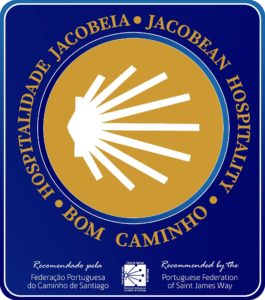 In the municipality of Covilhã passes an important path used by pilgrims from the south, or from Castile, to then proceed to Guarda, Trancoso, and then can choose to continue towards the so-called “Portuguese Way” or “Via de la Plata ”. The “Camino de Santiago in the Municipality of Covilhã”, a secular route is a medium difficulty route, covering about 13 kilometers, from Ferro (Pedra do Adufe) to Peraboa (Chapel of Divino Espírito Santo), where you can breathe nature, history and hospitality, it is duly signposted and in good safety conditions. With this walk, it is possible to start the Jacobean pilgrimage for those who wish to do so, being provided with the Pilgrim’s Credential, and who will have to do, in addition to this route, a minimum of 100 kilometers on foot ending in Santiago de Compostela .
In the municipality of Covilhã passes an important path used by pilgrims from the south, or from Castile, to then proceed to Guarda, Trancoso, and then can choose to continue towards the so-called “Portuguese Way” or “Via de la Plata ”. The “Camino de Santiago in the Municipality of Covilhã”, a secular route is a medium difficulty route, covering about 13 kilometers, from Ferro (Pedra do Adufe) to Peraboa (Chapel of Divino Espírito Santo), where you can breathe nature, history and hospitality, it is duly signposted and in good safety conditions. With this walk, it is possible to start the Jacobean pilgrimage for those who wish to do so, being provided with the Pilgrim’s Credential, and who will have to do, in addition to this route, a minimum of 100 kilometers on foot ending in Santiago de Compostela .
The Municipality of Covilhã welcomes pilgrims from Santiago, wishing them an excellent trip on the “path of the blessed”.
For this route it is advisable to wear comfortable shoes and clothes; cap or hat; the transport of water, cereal bars and nuts, important to prevent dehydration, lack of energy, cramps and dizziness.
The Albergue de Peregrinos, in Ferro, is now open for those making the pilgrimage to Santiago de Compostela. The Hostel has beds and bunk beds and can accommodate up to seven pilgrims per night, who must book in advance by calling: 964302817. The cost of the stay is €7 (seven euros) per person, and the presentation of the Pilgrim’s Credential is mandatory (1 ). In addition to sanitary facilities with a hot shower, the Hostel has social rooms and a kitchen where pilgrims can prepare their own meal.
The opening of this equipment took place at the beginning of May 2021, and since then there have been several pilgrims who have spent the night there. The Hostel is part of the Via Portugal Nascente Way, starting in Tavira, whose stages can be known at A. P. P. Ways to Santiago and Path via East Portugal
This is one of the routes that is in the certification phase in Portugal, attesting to its authenticity and the guarantee of quality and safety for the pilgrim.
1 – The Pilgrim’s Credential is an essential document for staying overnight in most pilgrim hostels (a small number of privately run hostels do not require the credential). It is also essential to obtain the Compostela, the “certificate” that proves that you have completed the pilgrimage to the Cathedral of Santiago de Compostela. Since 2014, the Credential has also been used to obtain a certificate of the distance covered, indicating the starting point of the pilgrimage.
The Albergue in the parish of Ferro has the «Hospitalidade Jacobeia» seal, which is awarded by the Portuguese Federation of the Way to Santiago to entities that stand out for the good reception of the Pilgrim of Santiago, in Portugal.
